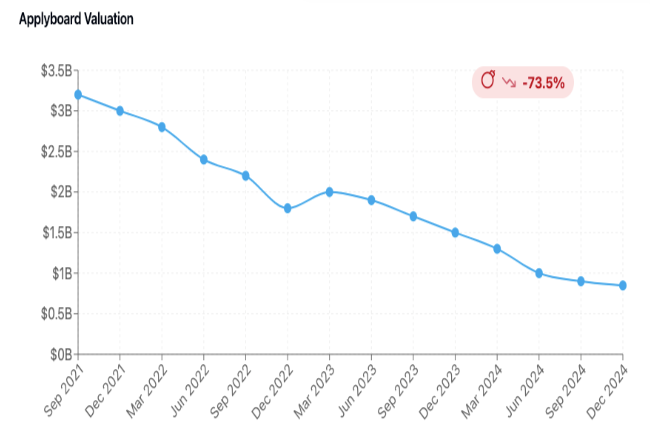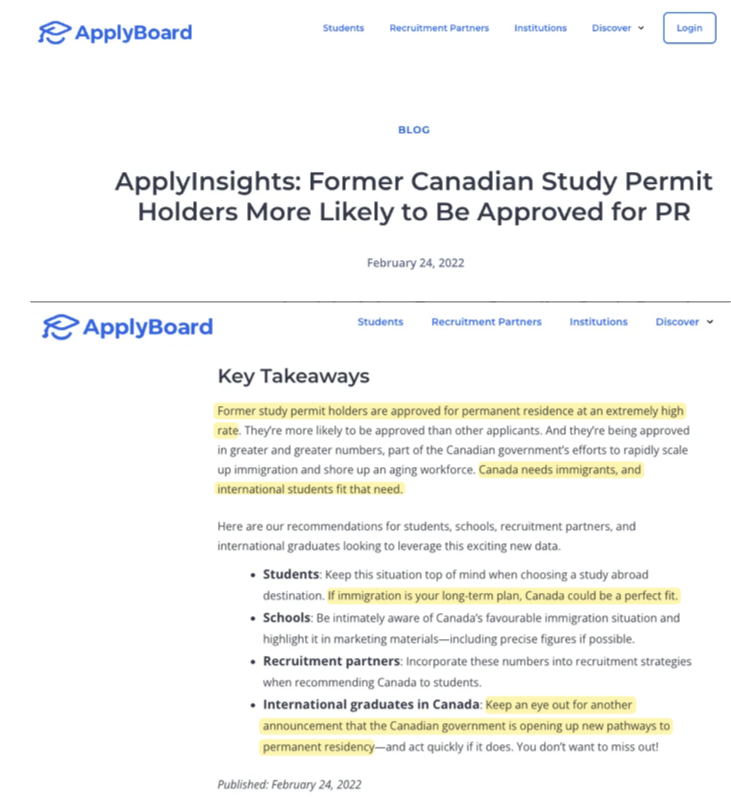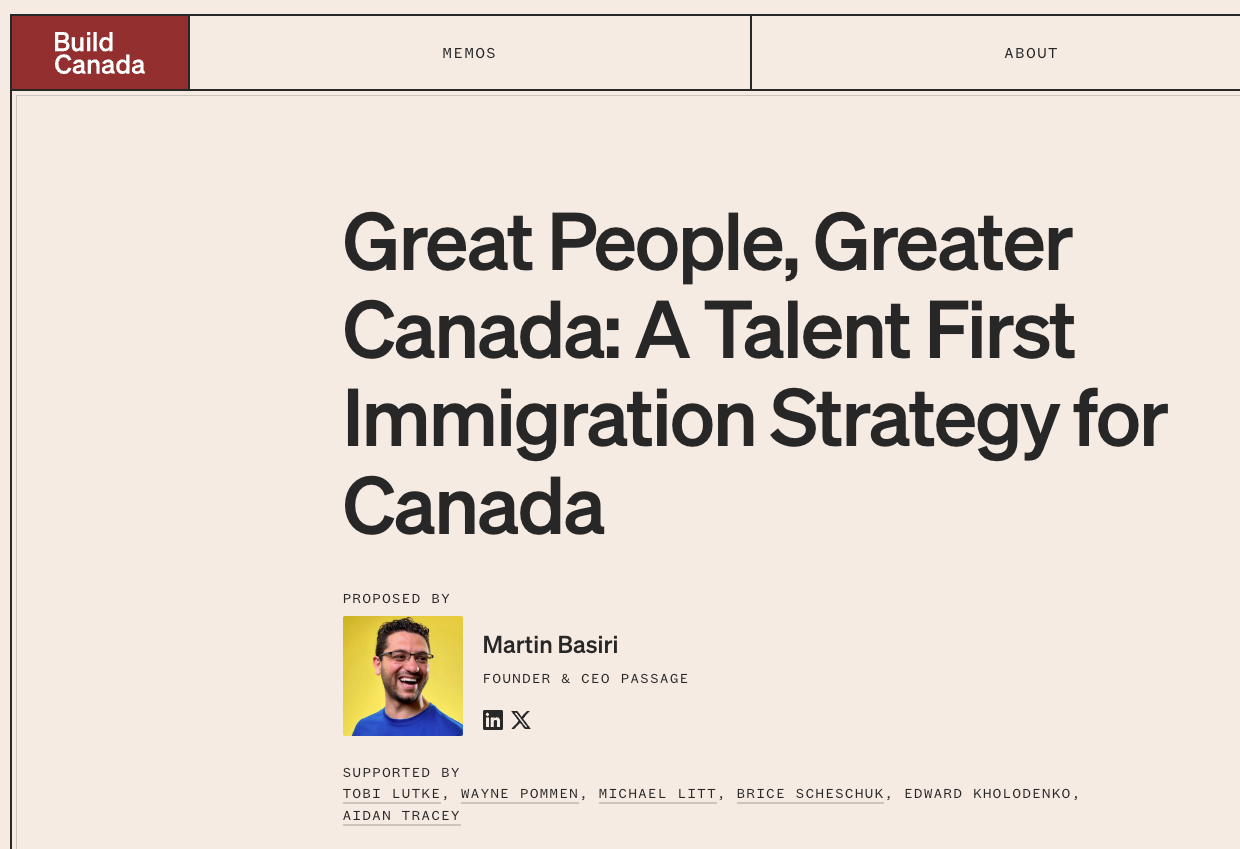Within about a decade of landing in Canada to study at the University of Waterloo, Iran-born Martin Basiri claims he turned down an offer to buy his startup ApplyBoard that would have seen him personally make $100m. At the time, he had $1,500 in his bank account. He reasoned that as soon as he sold, he'd want to start another company, so why bother when he already liked the one he had. Within 4 months of telling this remarkable story to The Toronto Star, Martin would be out of the CEO role at ApplyBoard and within 8 months, he'd have another startup. ApplyBoard, formerly a unicorn, has lost 74% of its peak valuation, when it enticed Captain Olivia Steedman of Teachers Venture Growth, the growth equity arm of Teachers Pension Plan, to invest. You'll recall she's a self-proclaimed patrol boat captain, but with a history of getting caught in train wrecks.
Teachers led the series D round that raised a total of C$375m and valued the company at C$4B (or US$3.2B). BDC, Quebec’s Caisse (aka CDPQ) and several private VCs also took part in the financing. ApplyBoard’s valuation promptly collapsed about 74% to date. We know this because ApplyBoard is a holding of two Fidelity funds that disclose valuations. The general collapse of private tech markets since 2022 is certainly a factor. But there’s reason to believe that ApplyBoard was an over-hyped investment that primarily rode the foreign student gravy train that took hold in Canada over the past several years. A trend that has now completely reversed. Stats reflecting the impact of the previously announced international student cap have been coming in. Declines in student permit issuances between 2023 and 2024 range from range from -17% at UofT to -73% at Conestoga College (a notorious beneficiary of foreign student enrolment). The overall national figure is a decline of 52%.

The Promise
ApplyBoard presents itself as a global, AI-driven platform that connects the world’s best students to the world's best educational institutions. It is claimed they have “helped” over a million international students from 150+ nations access 1,500+ educational institutions.
This has been presented as a rare Canadian success story – a home-grown unicorn – one of the few local startups that has achieved escape velocity, etc, etc. Founded in 2015 by three brothers, first generation Canadians who came from Iran for an education, and stayed to build value. Martin Basiri landed in Canada first, to complete a Masters degree in Mechatronics at the University of Waterloo. His brothers Meti and Massi came after. They are graduates of the somewhat less prestigious Conestoga College. Meti has a degree in Business Administration and Massi has a diploma in Fitness and Health Promotion.
The inspiration for the company came from the three brothers’ own first-hand experiences trying to navigate our educational system. Now they want to give back. In a world that combines huge challenges and untapped human potential, what could be more noble than making Western education more accessible? In total, ApplyBoard raised $600m. That’s a lot of believers!
Leaving aside how much ApplyBoard is truly worth and what its fate might be, I must take a moment to highlight what a remarkable achievement it is for someone to come from Iran, speak accented English with an imperfect command, and still manage to raise that kind of money and, even if briefly, reach unicorn valuations. All within a decade. Meanwhile, you have many locals whining that it's impossible to do business here and that Justin has ruined everything. We have investors that are just as shallow and momentum-driven as anywhere else on Earth! Go Canada!
You can watch this video to get a feel for ApplyBoard:
You feel like wiring him your life savings, yes?
The ESG Spin
Teachers will of course pay lip service to ESG and “responsible investing” considerations. Here’s Olivia Steedman commenting on the ApplyBoard funding:
“At Ontario Teachers’, we have a fundamental belief in the value of a top quality education. ApplyBoard’s technology platform is simplifying the process of connecting students and educational institutions and creating greater opportunities for education globally.”
And of course, there’s the obligatory photo op with Justin:

ApplyBoard was initially backed by public funds and received multiple rounds of government funding in the early years, including via the IRAP program. That’s the National Research Council’s Industrial Research Assistance Program. The NRC invented the cardiac pacemaker, the electric wheelchair and now they’re helping Indian students fill their college applications faster. In 2021, ApplyBoard was awarded the (Ontario) Premier’s Award and in 2022, it was awarded the Governor General’s Innovation Award.
The Reality
What I’ve found in my research on ApplyBoard tells a different story and brings focus to questions I’ve been mulling for years, about investment due diligence, market hype, responsible investment, and the downsides of finance-driven disruption.
ApplyBoard is essentially an agency managing outsourced student recruiting on behalf of colleges. It has thousands of recruiters, mainly in India. This means that schools no longer have to do the expensive, time-intensive work of managing their own agents. According to critics, aggregate recruiters such as ApplyBoard allow educational institutions to outsource their salesforce while avoiding accountability. Firms like ApplyBoard are not regulated in Canada, unlike some other countries. Recruiting students can be very lucrative, since foreign students pay anywhere from $15k to $30k per year. My understanding is that an aggregate recruiter like ApplyBoard retains a 15-20% commission of the first year fees. They would share this with their sub-agents. Given ApplyBoard’s claim of having helped a million students to date, the earning potential is certainly there. ApplyBoard made the list Sean Silcoff of The Globe recently compiled of Canadian private startups with revenue above $100m.
But the potential for abuse also exists. ApplyBoard has been caught in the media fallout from practices condemned as exploitative of the students and abusive of the immigration system. The essence of this scandal is that large numbers of mostly Indian students were recruited into studying in Canada at barely-credible, greedy colleges. Between 2018 and 2022, the number of Indian student visa-holders has gone from 172k to 319k according to official figures. The students were primarily lured by the promise of an easy path to citizenship once they graduated. Their families back home often incurred crippling debt to give them a shot at living the Canadian dream. Once here, however, the students struggled to pay high tuition fees and living costs, so they had to take on jobs, often under exploitative conditions. The students were often forced by financial constraints into appalling housing arrangements. In one reported instance, 14 students shared a single house. Funeral centre directors have noted with alarm a booming business in repatriating bodies to India. And now, the government will block their path to permanent residency and citizenship for those who do want to remain.
You can understand that recruiting students is how ApplyBoard makes its money, the technology is secondary. As for the AI claims, one customer-facing tool they announced is Abbie, a personal education advisor powered by OpenAI. The app was launched to select partners in June 2024, with a wider rollout in the coming months. Seven months later, there’s just an “early access” waitlist online.
In sum, I believe that:
-There is very little sophisticated technology involved (based on public comments by employees and a review of three patents)
-The overwhelming focus is/was on one market only: India
-The business model was based on reaching scale in India - an immigration play targeting one country was the “flywheel” for growth
-The strategy to reach scale was based on dangling the possibility of securing permanent residency in Canada, not higher education (which goes against the principle that the foreign student visas are not intended as a route to permanent settlement)
The Law
ApplyBoard says it vets all its recruiters, rejecting 46 percent of applicants. It will say that it has training and compliance procedures. Here’s one example of ApplyBoard’s questionable methods. Recruiters are not allowed to present student visas as a route to immigration (i.e. permanent settlement). The CBC’s 5th Estate investigation program did a show on this problem in 2022 and ApplyBoard featured prominently, including this undercover footage of non-compliant promises by their “recruitment partners” in India.
Here’s a 2022 blog post, still available on ApplyBoard’s website, providing guidelines for students, schools, “recruitment partners”, and international graduates:

ApplyBoard: Disruptive Technology or Disruptive Funding Model?
Despite their claims of global coverage, I suspect the vast majority of ApplyBoard’s student clients were from India, recruited for Ontario colleges, and given sham courses through satellite campuses as a route to citizenship (a route that is now closed or closing). In 2022, ApplyBoard claimed that “An incredible 1 in 4 international students who came to Canada from South Asia in 2022 did so through ApplyBoard.”
Ontario’s college system had struggled for years with flat or declining provincial funding and a tuition freeze imposed by the Ford Government. To fill the gap, the colleges became addicted to international students and the extra fees they pay.
Government sources blamed private colleges for the student surge but the story is really one of public sector neglect and mismanagement. Conestoga College - the alma mater of two of the founding brothers at ApplyBoard - is at the center of this storm. ApplyBoard, coincidentally, was incubated at Kitchener-based Conestoga College and the college provided their first educational “partnership”;.
Local Kitchener real estate manager, Craig Haney, was quoted as early as 2019 saying that
ApplyBoard, “is one of the reasons the college’s international student population has expanded so much. Whether it’s synergistic or by accident, it’s awesome.”
From 2018 to 2023, the 18 Ontario Universities brought in 159,286 international students. Over the same period, the 21 Ontario Colleges recruited 589,092 international students.
Conestoga took in 81,447 students over the same period. In other words, a single college out of 21, managed to “recruit” more than 50% of all the international students attending Ontario’s universities! 85% of Conestoga’s students come from one country: India.
Conestoga is run by long-time Tory donor John Tibbits and he chairs a college board that includes Ford appointees and donors (Martha George, Aaron Scheewe, Amar Kumar, and William Dahms).
Tibbits likes to refer to “his” college as a business and has been on a spending and building spree for years. He has pushed back against criticism about the massive operating surpluses he has generated on the backs of international students. Last year, this surplus was reported at $252m.
Conestoga used this windfall to, among other achievements, build a downtown Kitchener campus to serve international students and recently opened a new college location in Waterloo, modestly named “The John W. Tibbits Campus”
The abrupt change in immigration policy by the Federal Liberals has upended the business model for Conestoga, and many other colleges and universities, leading to program closures, layoffs, and recriminations. Tibbits recently settled a defamation suit brought by David Orazietti, President of Sault College, who he had labeled “a whore”.

I will not comment here on the moral rectitude of either man but note in passing that the majority of Sault College students are located in Brampton, 700 kms from the main campus in Northern Ontario.
A Pathway to Education, or a Pathway to Canada?
On the issue of ApplyBoard’s reach to 150+ nationalities, I did a LinkedIn search in mid-January to get a staff breakdown by country. This results in 1,400 hits for those “currently” at ApplyBoard, of which:
485 are located in Canada
661 are located in India
10 are located in the Philippines
15 in China
48 in Nigeria
This again confirms that India is the essential market for ApplyBoard. For as long as Western countries will be facing population challenges and labour shortages, because prosperous Westerners don’t want to be doing menial jobs, and as long as there will be people in developing countries yearning to improve their lot in life, ApplyBoard can redeploy in new markets. The UK had its bogus college reckoning around 2010. Canada seems to have turned a blind eye to their lessons. Germany has not had this issue, yet. ApplyBoard just launched there last month.
How do you reconcile Captain Olivia's quote about Teachers' "fundamental belief in the value of a top-quality education" with ApplyBoard's association with "diploma mills"? What kind of due diligence was performed and how is this "responsible investing"? ApplyBoard's original CEO until 2022, Martin Basiri has now launched a separate startup focused on student funding. Having founded a startup that lures students to diploma mills, he now advocates for a "talent first immigration strategy", as part of the recently unveiled Build Canada initiative.

I’ll close with a selection of public comments from Reddit from before, and after, Teachers turned ApplyBoard into a unicorn.
Appendix
Here’s a sampling of adverse comments about ApplyBoard from Reddit, before and after the Series D investment. These comments are copied here verbatim for your convenience, they have not been fact-checked. Keep in mind it's the general nature of online comments, often anonymous, that they can be hyperbolic, just plain wrong and biased to the negative. The goal is not to give credence to any specific allegation, but to point to waters that might warrant further patrolling.
Before the Teachers investment:
- "Pointing fingers is a weekly occurrence in engineering. Even worse, upper management is extremely toxic, blaming individual contributors for their lack of knowledge surrounding pipelines and legacy code.
- Spaghetti/legacy code throughout all domains is common. Developers often say, 'It is the way it is.'
- Many hacky solutions exist in the codebase, either added due to a lack of code quality or pushed because of strict deadlines that are never revisited or refactored." — June 6, 2021
"So much of their staff experiences a pay divide. They overpay a bunch of made-up titles for managers who don’t actually do any work, while their customer experience (CX) team and software staff work double time. CX hardly gets benefits despite their low pay, and overtime hours only clock in after several hours.
The Labour Ministry even flagged them once for inappropriate working hours. Founders refuse to change or improve employee benefits. When asked about better benefits and RSP matching, Martin responded that 'saving on that will make everyone rich,' meaning only himself.
Almost 30 people left the company in early 2020. HR tried to cover it up, telling departing employees they couldn’t say goodbye to their colleagues. Additionally, employees in multiple departments faced harassment after submitting their two weeks' notice, with founders calling them incessantly to discourage their departure." — May 27, 2020
- "Poor investment in systems and processes: The CXOs are pennywise and pound foolish. They are extremely averse to investing in good systems, software, and expert consultants to set things up properly.
- Teams constantly struggle as daily activities are highly manual and disorganized. Despite this, management expects teams to know everything and deliver results in unrealistic timeframes." — April 17, 2021
"Initiatives and changes come from above. Software developers have little to no power to change processes. There’s too much legacy code, and no efforts are made to improve it. Architectural decisions are slow and follow a waterfall approach." — Senior Software Engineer, Nov 11, 2020
- "They have a toxic culture stemming from the top. Staff are constantly degraded and underappreciated.
- Transparency is nonexistent, with information being withheld to the detriment of company operations. Employees are left without the tools or knowledge needed to perform their jobs.
- There is no path to long-term sustainability. They keep implementing temporary fixes until everything falls apart." — Jan 7, 2021
After the Teachers investment
- "Exploitative conditions: A staggering number of new employees are fresh Canadian immigrants. Perhaps they realize that local Canadians won’t tolerate such a hostile working environment.
- Goodbye technology: The COO, heading product and engineering, is not an engineer. His technical knowledge is limited to Excel sheets. Any idea outside of 'tabular' storage is alien to him, resulting in severely underpowered architecture." — Dec 18, 2021
"Most CX employees are completely incompetent. It’s not a training issue—they’re untrainable. Incompetent CX managers are shuffled between teams with no oversight.
The sales department, even more untrainable than CX, has no understanding of company operations and no desire to learn. Instead, they aggressively blame CX for their shortcomings, contributing to the toxic environment." — Feb 10, 2021
"This company runs solely on marketing, with no real substance. They claim to be on a mission, but in reality, they’re just conducting shady B2B business with offshore clients. They DON’T even contact students directly." — Dec 8, 2021
- "There are numerous shady practices around recruitment partners and student agreements." — Jan 16, 2024
"They claim to want to 'educate the world,' but their actual goal is to get rich people to pay for Canadian university admissions by helping with resumes and SOPs. They take 10% of the student’s tuition as their cut.
Their product is nothing special—it’s mostly humans doing matching work. They claim to be solving a tech problem, but it’s all manual." — Sep 22, 2023
"A Ponzi scheme: This company needs to be investigated. Top management lies constantly, pretending to care about employees while bleeding cash.
Their AI is nonexistent, yet they claim it’s cutting-edge. They fabricate 'growth' to raise more investor money, aiming to go public, cash out, and dump losses on investors.
Their mission is not to educate but to subsidize the pathway for Indian students to Canada, exploiting them with project management and business diplomas." — Aug 30, 2023
"Overwhelming evidence points to the company being a racket, shipping students into Canada and leaving them to struggle with the cost of living crisis.
Despite positioning themselves as 'anti-fraud,' they exacerbate problems for profit. They exploit a broken immigration system and abandon students once their fees are paid." — Nov 4, 2023
"The company profits from Indian students but treats its Indian employees terribly." — Nov 17, 2023
"Everything that glitters is not gold: Their product lacks market fit outside of Canada." — Nov 21, 2023
"The CEO’s qualifications include a one-year marketing certificate. His role is to run a propaganda machine claiming, 'We educate the world!'
In reality, the company profits from a broken immigration system, exploiting students and employees alike. They mislead communities and investors while providing no real education or support." — Aug 31, 2023
"Top management is weak in decision-making. They hired people in early 2022, only to lay everyone off by November. They have no clear direction, relying solely on funding rounds for survival." — July 4, 2023
- "Low pay: Some departments, like CX, are severely underpaid and overworked.
- Immigrants/newcomers fill these roles as locals know they can get better-paying opportunities. The founders exploit this vulnerability.
- Despite raising millions, the founders spend extravagantly while underpaying employees responsible for processing international student applications." — July 19, 2022
“Their tech stack is outdated and rigid, and only a limited number of people have a say on what they should use and how they should do it. Good luck convincing them to change things around...” — Jan 8, 2022
“The Chief Architect is MIA. He's only ever worked at this company (5 years) and has never actually been an architect, just a mid-level developer.” — April 5, 2022
“Garbage codebase written by outsource shops; inexperienced leadership has no direction or morality; employees scramble about to get good reviews from management, do nothing; absolutely no experience writing big scale.” — June 29, 2022
“I joined this organization 2 months ago in the Gurgaon office as a document specialist (CX team), and they are treating us like day laborers. People have to work on weekends and public holidays. During hiring, it was communicated that the job would be from Monday to Friday, which is not the case. How can we have work-life balance and enjoyment in life if my family and friends have weekends off and we have weekdays off? They even forced us to work on October 2nd, a public holiday as per labor law, where there should be double pay and compensatory off. However, we haven’t received any such benefits. This is a violation of Indian labor law as per section 18(1). It's like a prison for youngsters like me. They even want us to log in for some time on our week off. Here, you stop living your life and live according to management. We are just puppets.” — Nov 7, 2021
“This company is very disorganized. Most of its achievements rely on investors, but its operating model is not scalable and inefficient. Advice to Management: You must listen to the sales teams across the world and not just rely on one market.” — Jul 18, 2022
“It’s MANUAL. They keep trying to tell folks they are a 'tech company' making it 'easier,' but they are a recruiter-run company with Excel spreadsheets and manual processes. They manually review applications and send them to schools. They are the worst middlemen who somehow got $300 million invested in them to manually apply to schools and basically house thousands of scammy recruiters. Screw this piece-of-crap company.” — 1 year ago
“ApplyBoard. It’s a toxic, scam-ridden company pulling the wool over everyone’s eyes by calling themselves a 'tech company.' Media and government bodies praise them as our Canadian tech saviors. They sit on tech council boards in Canada (looking at you, Communitech), despite not running an actual tech company. They operate a data center with no real software, as 99.9% of tasks are done manually by their Indian office.” — 1 year ago
“Imagine being tricked by ApplyBoard scammers to apply to college here from India. The Canadian government says $10k/year is enough, only for you to arrive and find out that splitting a room costs $7,800 of the $10k. The lines for jobs are a mile long, and starting Jan 1, you can’t work more than 20 hours. No one respects your diploma-mill education either. These students are lied to all the way down the line, ending up in worse situations than at home.” — 3 months ago
“When I worked there, recruiters were submitting dozens of applications with identical addresses. When we flagged it as likely fake, we were told to ignore it. They openly advise students on the quickest way to get PR, the easiest programs, and how to game the system. The CMO has WhatsApp chats giving illegal immigration advice off the record.
Don’t give this company any credit. We have larger issues with the government and schools, but this should be the final nail in ApplyBoard’s coffin. They run a scam and pretend to be a tech company.” — 1 year ago
“As for whether they’re a bezzle, it’s likely. Revenue generation is tied to the number of students placed. I'd wager they pitched aggressive growth to investors, but how does their revenue compare to expectations? It’s all smoke and mirrors.” — 1 year ago
“ApplyBoard needs to be dismantled and investigated. Fraud is rampant. They are basically a search engine for schools—think Expedia but for programs. They outsource almost everything to India, which now has more staff than Canada, while still receiving grants for 'helping the job market.'
They run a sausage factory to fill quotas without considering quality or ethics. Raising the funds requirement to $22k may reduce supply and force ApplyBoard to focus on quality instead of quantity, but only time will tell.” — 5 months ago